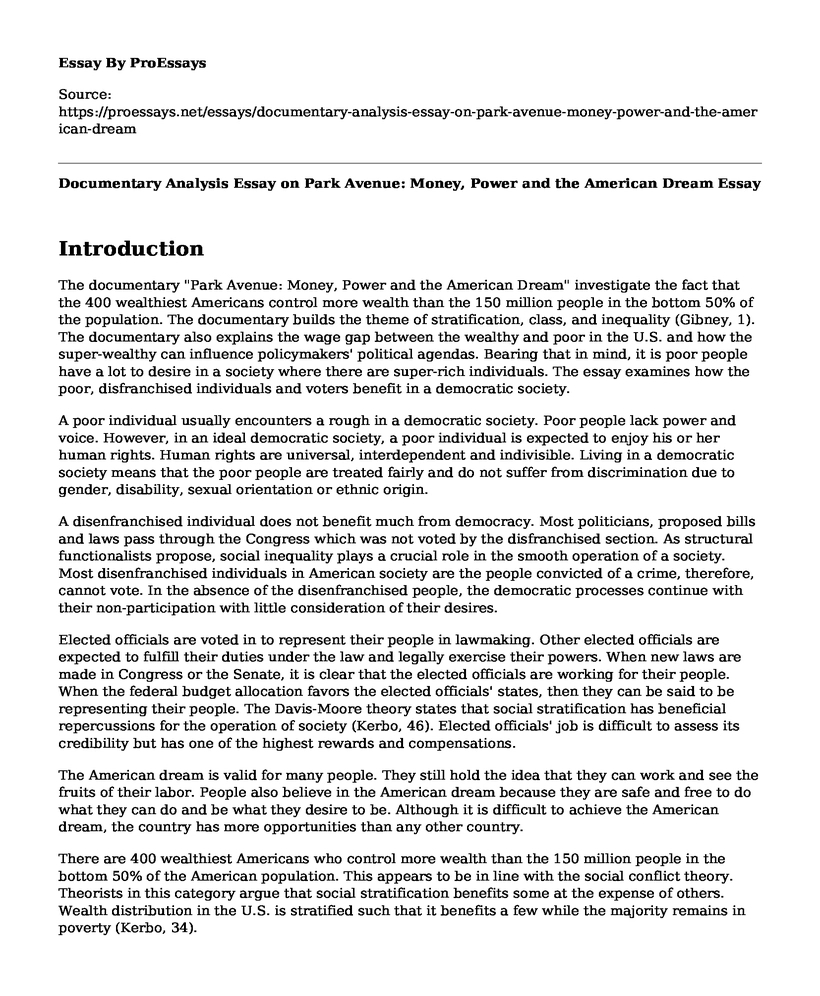Introduction
The documentary "Park Avenue: Money, Power and the American Dream" investigate the fact that the 400 wealthiest Americans control more wealth than the 150 million people in the bottom 50% of the population. The documentary builds the theme of stratification, class, and inequality (Gibney, 1). The documentary also explains the wage gap between the wealthy and poor in the U.S. and how the super-wealthy can influence policymakers' political agendas. Bearing that in mind, it is poor people have a lot to desire in a society where there are super-rich individuals. The essay examines how the poor, disfranchised individuals and voters benefit in a democratic society.
A poor individual usually encounters a rough in a democratic society. Poor people lack power and voice. However, in an ideal democratic society, a poor individual is expected to enjoy his or her human rights. Human rights are universal, interdependent and indivisible. Living in a democratic society means that the poor people are treated fairly and do not suffer from discrimination due to gender, disability, sexual orientation or ethnic origin.
A disenfranchised individual does not benefit much from democracy. Most politicians, proposed bills and laws pass through the Congress which was not voted by the disfranchised section. As structural functionalists propose, social inequality plays a crucial role in the smooth operation of a society. Most disenfranchised individuals in American society are the people convicted of a crime, therefore, cannot vote. In the absence of the disenfranchised people, the democratic processes continue with their non-participation with little consideration of their desires.
Elected officials are voted in to represent their people in lawmaking. Other elected officials are expected to fulfill their duties under the law and legally exercise their powers. When new laws are made in Congress or the Senate, it is clear that the elected officials are working for their people. When the federal budget allocation favors the elected officials' states, then they can be said to be representing their people. The Davis-Moore theory states that social stratification has beneficial repercussions for the operation of society (Kerbo, 46). Elected officials' job is difficult to assess its credibility but has one of the highest rewards and compensations.
The American dream is valid for many people. They still hold the idea that they can work and see the fruits of their labor. People also believe in the American dream because they are safe and free to do what they can do and be what they desire to be. Although it is difficult to achieve the American dream, the country has more opportunities than any other country.
There are 400 wealthiest Americans who control more wealth than the 150 million people in the bottom 50% of the American population. This appears to be in line with the social conflict theory. Theorists in this category argue that social stratification benefits some at the expense of others. Wealth distribution in the U.S. is stratified such that it benefits a few while the majority remains in poverty (Kerbo, 34).
Conclusion
Conclusively, poor people living in a democratic society enjoy human rights just like the rich. However, the disenfranchised do not benefit much from democracy. Most decisions are made without their consideration. Many people believe in the American Dream due to the opportunities available in America despite the top 400 richest people owning the factors of production.
Works Cited
Gibney, Alex. Park Avenue: money, power and the American dream. (2012). Retrieved from: https://www.youtube.com/watch?v=6niWzomA_So on date 28/2/2019
Kerbo, Harold R. Social Stratification and Inequality: Class Conflict in Historical, Comparative, and Global Perspective. Boston, MA: McGraw-Hill, 2003. Print.
Cite this page
Documentary Analysis Essay on Park Avenue: Money, Power and the American Dream. (2022, Dec 08). Retrieved from https://proessays.net/essays/documentary-analysis-essay-on-park-avenue-money-power-and-the-american-dream
If you are the original author of this essay and no longer wish to have it published on the ProEssays website, please click below to request its removal:
- Working In the Interior Ministry - Admission Essay
- Paper Example on State Health Policy
- Psycho Movie and Horror Genre Paper Example
- Economic Comparison of Somalia and Venezuela Paper Example
- Nixon and Obama Contribution to Humanities Paper Example
- Essay Example on Economic Theories & Indicators: US vs China
- Community Policing: Enhancing Quality and Safety of Neighborhoods With Public Participation - Research Paper







